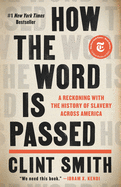
Every part of the U.S. has deep, often unacknowledged ties to the institution of chattel slavery. In How the Word Is Passed, his first nonfiction book, poet and educator Clint Smith (Counting Descent) visits eight locations with complicated histories relating to slavery, illuminating those histories for his readers and connecting each place to the larger narrative of racism in the U.S.
Smith begins in his hometown of New Orleans, where new markers are documenting the city's relationship to the transatlantic slave trade. They contrast with the many streets, schools and other public sites named after enslavers. This disconnect--the honoring of whites and the erasure of Black stories, no matter the era--continues as Smith embarks on his nationwide self-guided tour of places bearing the deep scars of slavery. He visits Monticello, Thomas Jefferson's Virginia estate, where some of the guides dodge questions about Sally Hemings; the notorious Angola Prison, which barely acknowledges its history as a slave plantation; and Galveston Island, Tex., where celebrations of Juneteenth have a long and proud legacy. Eventually, Smith travels to New York City--not exempt from this reckoning despite its location far north of the Mason-Dixon Line--and to Goree Island, Dakar, Senegal, once a transition point for millions of slaves and now a memorial to their suffering.
Each place, no matter its current approach, is vital to a holistic understanding of slavery in the U.S. Smith's work is a passionate, thought-provoking, brilliantly observed call for Americans to take a new, uncomfortable but essential look at their own history. --Katie Noah Gibson, blogger at Cakes, Tea and Dreams

